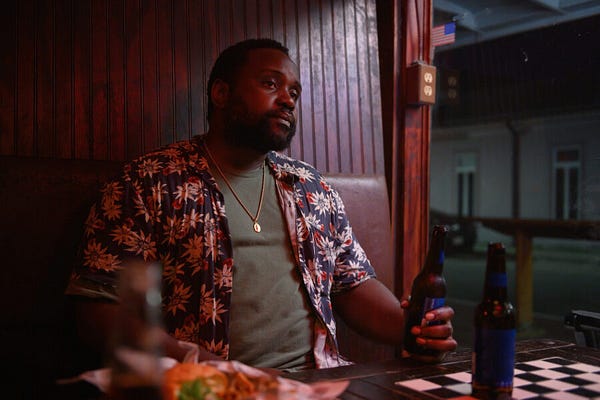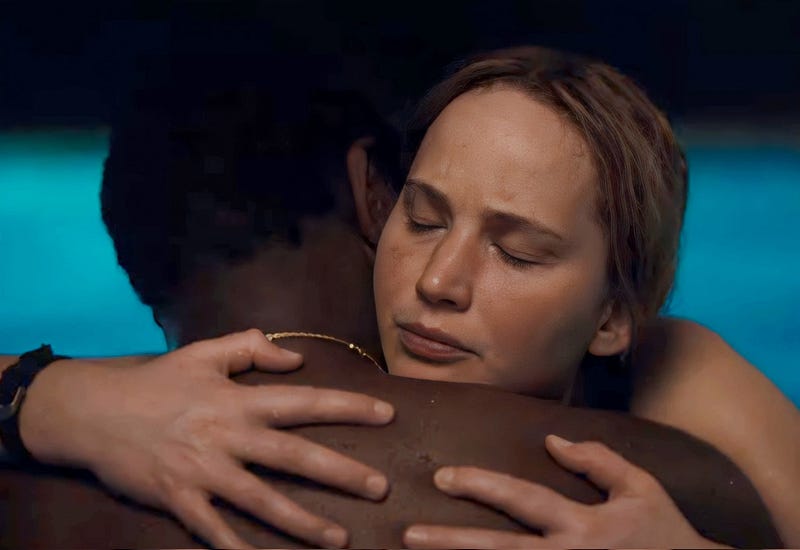Jennifer Lawrence and Brian Tyree Henry anchor a tender yet searing portrait of emotional restoration

Lynsey (Jennifer Lawrence), a former Army Corps of Engineers service-member, has returned stateside after enduring a traumatic brain injury. Recovering in the home of caregiver Sharon (Jayne Houdyshell), Lynsey gradually recuperates enough to regain control of her motor functions. Sharon believes Lynsey’s ready to return home to New Orleans, but Lynsey’s all too eager to head back to the Afghan front, desperate to escape from the psychological war zone waiting for her at home. However, in order to prove herself to a neurotrauma specialist (Stephen McKinley Henderson) that she’s capable of returning to service life, Lynsey must head back home. Amidst the grimy pools that Lynsey cleans across the city for work, Lynsey confronts mental wounds both fresh and scarred with the help of amputee mechanic James (Brian Tyree Henry), who Lynsey learns is harboring traumatic scars of his own.

Jennifer Lawrence and Brian Tyree Henry’s understated yet no less devastating performances propel this quietly compelling film by Lila Neugebauer. Lawrence and Neugebauer approach Lynsey’s post-war recovery with a shared sense of agency and determination, refusing to define Lynsey by her traumatic disability. Instead, their focus is keenly attuned to how Lynsey’s present condition exposes her deeper-rooted refusal to confront and make peace with the life in New Orleans she escaped once with Army life–which many others in the film view as twice trading a frying pan for a fire. However, Neugebauer also explores with a quiet tenderness how Lynsey’s struggle equally brings out similar repressions among those she interacts with, notably Henry’s James. Left an amputee after an accident that killed close family members, James’ story resonates with Lynsey on a needed emotional level. Henry plays James as someone far further down the path of recovery than Lynsey, showing that such progress may lie in store for her and that her dreams of resuming a normal life might be possible. However, physical recovery doesn’t necessarily equate to emotional restoration–and together, they help each other realize just how much more of their personal journeys there is to go.

Much of Causeway is made up of their gentle interactions with one another, fueled by a platonic care that nearly veers into the romantic. However, Neugebauer, Lawrence, and Henry all realize that Lynsey and James’ relationship doesn’t need to feel obligated to be romantically consummated in order to give these characters an emotionally fulfilling or impactful meaning to one another. Rather, these are two deeply wounded people whose paths cross just when they need to; together, they challenge and provide comfort to one another, drawing out each other’s anguish and rage like poison from a wound in the most compassionate ways. There aren’t extravagant breakdowns or relapses in Causeway to relay an overdramatized sense of performative catharsis. Instead, the film recognizes that there isn’t one key moment of recovery, whether it’s physical or mental. The work continues every day, for everyone, with good and bad days taken in equal weight. The disparate moments that make up Neugebauer’s film are equally patient and measured, celebrating quiet victories and providing low-key consolation where both appear.


The world these characters drift among is intimately realized by Neugebauer, cinematographer Diego García, and veteran production designer Jack Fisk, creating a vibrant world of lush greenery and hazy neon amidst the streets of New Orleans. The inner recovery of its characters is modestly externalized throughout in every cleaned pool or cracked slab of concrete, and the ritualized work that Lynsey and James put into their respective professions is a welcome foil to their own internal progress. Dynamic supporting performances by Linda Emond and Russell Harvard further shade in the secrets harbored and endured by Lynsey without sacrificing a sense of their own individual journeys. With Emond and Harvard as Lynsey’ mother and brother, Neugebauer shows how Lynsey’s family has each confronted their own traumas and shortcomings in ways that are beneficial as well as potentially toxic.

Lynsey faces the same choice–and through the journeys of those around her, we realize just how difficult it can be to forge any path forward. However, the choice to do so isn’t just valid–it’s wholly necessary.
Causeway opens in limited release on October 28th, with a streaming debut on AppleTV+ on November 4th.



